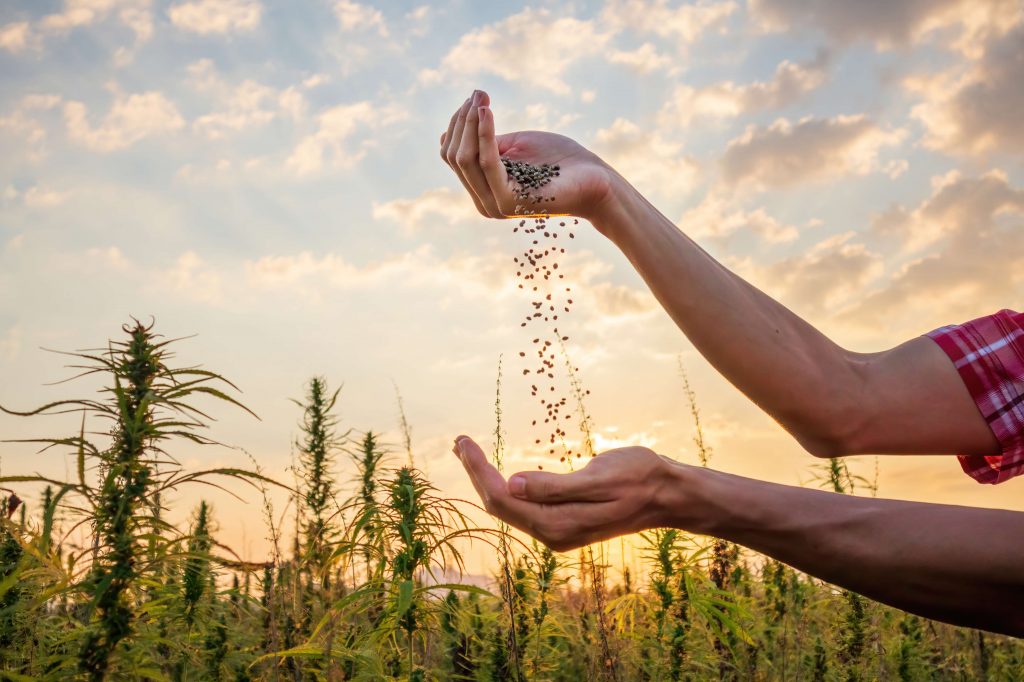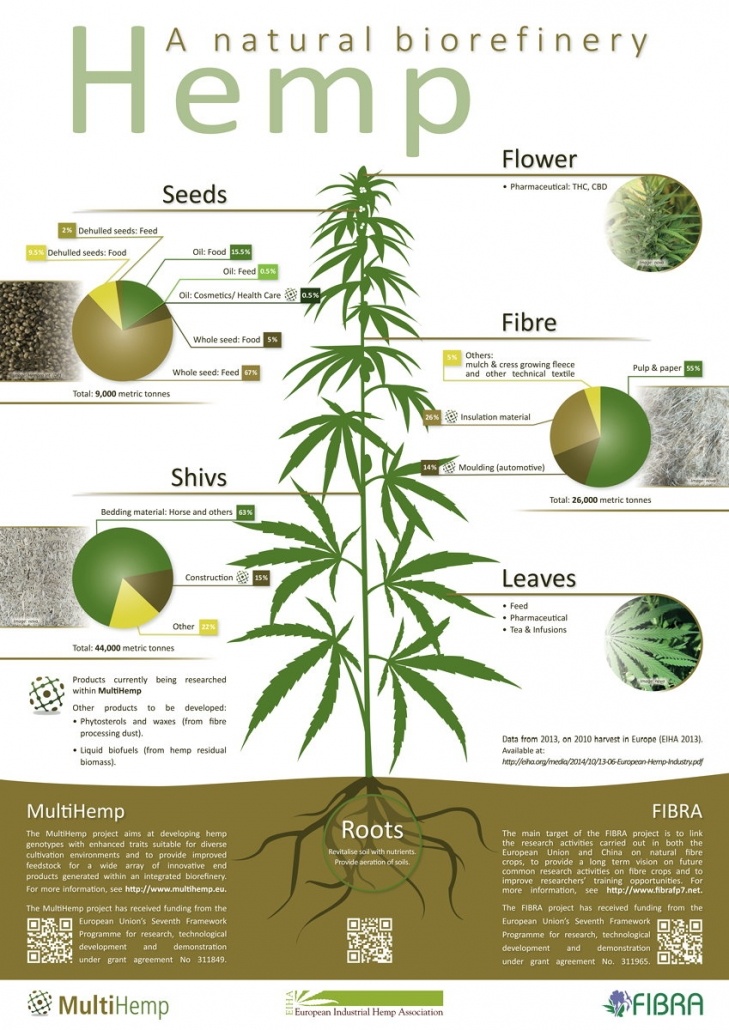I enjoyed reading this article on the history, philosophy and direction of Oregon CBD Seeds. With input from Seth and Eric Crawford, the brother founders and breeders of the family owned company this article provides great insight into the development of the high CBD industry and some of the inherent challenges of the hemp and cannabis industry.
Read the original report in Portland Business Journal »
Read the Original report on Oregon CBD Seeds »
A $50M Oregon hemp seed producer and a fast-growing cannabis genetics firm gird for a Big Ag onslaught
PORTLAND BUSINESS JOURNAL — It’s not easy for a new entrant to separate itself from the herd stampeding into hemp-derived CBD products, to lend a sheen of legitimacy that might entice investors. But one apparent technique is to invoke Seth and Eric Crawford.
That’s what the Virginia company Exactus Inc. did in early March. Pivoting hard from a stalled point-of-care medical diagnostics business, Exactus boasted that it was “assured supply of superior seed genetics and has placed a large order for seed provided by … the highly regarded Crawford Brothers hemp seed genetic stock company.”
That would be Oregon CBD, which might qualify as the most successful startup in the short but fevered history of legal Oregon cannabis.
Founded in 2015, the company beat big agricultural players to the punch and is literally selling hemp seeds to farmers as fast as it can produce them. This year, that could translate into $50 million in sales for the Crawfords, who grew up in a hand-built log cabin in Josephine County, where they were regulars in cut-flower competitions at the county fair.
“We took the risk to build this when it made sense for a small private company with no outside investors,” Seth Crawford said. “None of the publicly traded or investor-driven companies were going to do this.”
But the kind of money the Crawfords are making gives off a scent as powerful as the terpene-rich hemp varieties they develop. The brothers are dedicated to remaining independent and supporting a craft vision for Oregon’s industry. But can they maintain their leadership position as the regulatory terrain opens up, bringing the threat of big-money competitors? It’s a question another Oregon-born cannabis leader is contemplating.
“We are in a magic window now, where we are not competing with all the multinational corporations that do this science,” said Phylos Bioscience CEO Mowgli Holmes.
The Portland-based genetics company is stepping up its efforts to develop improved cannabis plants, including hemp. Like Oregon CBD, Phylos promotes a future of diverse, interesting, quality-focused Oregon producers. But it knows the clock is ticking.
“When things open up, that’s going to be terrible for us,” Holmes said. “Truly terrible. Politically, we want full legalization. Practically, for us, that just means that all the big ag companies are going to come in and crush us.”
The fear may be exaggerated, but the threat is real.
Hempification
One thing that’s clear is that hemp will be a bigger part of Oregon’s cannabis future than anyone might have imagined when voters passed recreational legalization in 2014. But the seed of hemp’s growth was planted that very year, when President Barack Obama signed into law a Farm Bill that authorized state-sanctioned research and pilot programs.
The plant had a long history in the U.S. as a fiber crop, cultivated at Monticello and Mount Vernon by those famous hippies Jefferson and Washington. It came under assault in the 1930s as marijuana hysteria swelled, and growing hemp was more or less banned when the plant was lumped in with marijuana in the Controlled Substances Act of 1970.
They are the same plant — Cannabis — but with a key difference. What defines hemp is the near-absence of the intoxicating compound THC, by law limited to 0.3 percent concentration in a world where THC levels in recreational weed frequently top 20 percent.
That difference is one factor in hemp’s reemergence; the other lies in what it can share with cannabis: other cannabinoids, and terpenes, sought for their medicinal qualities. These compounds can be highlighted in a “wide” or “full” spectrum oil. In addition, CBD, the most sought-after cannabinoid — so far — can be isolated and processed to a powder.
Last September, analysts at Brightfield Group forecast that the CBD market would grow from around a half-billion dollars in 2018 to $22 billion in 2022.
Farmers in Oregon have stepped up to meet rising demand. In 2015, the first year of a federally sanctioned state program, 13 growers registered with the Oregon Department of Agriculture; by last year, the number was up to 584. In December, a new Farm Bill signed into law by President Donald Trump ended prohibition of hemp, and although full implementation won’t come until next year, the Oregon grower count for this year was at 1,008 and rising as of Monday. Those growers said they expect to plant 28,783 acres, a nine-fold increase over 2017.
Around half that crop will come courtesy of tens of millions of $1 apiece seeds from the Crawford brothers.
Good seed
“There are cheaper seeds,” said Cody White, owner of Willamette Valley Growers, which plans to plant at least 750 acres of hemp this year using Oregon CBD seeds. “The big draw (with Oregon CBD) is they are proven. When you plant them in the field, you get what they say you’re going to get, and that’s definitely not always the case in hemp.”
The first thing the seeds have going for them is that they are all female, “feminized” in a traditional breeding process — no GMOs here — accelerated by the use of advanced technologies.
Wait: Make that 99.97 percent female — 1 in 4,000 plants is likely to show male characteristics, Seth Crawford said. This remarkably low rate eliminates the risk of male interlopers pollinating their neighbors and rendering them seedy and lower in cannabinoids.
Each Oregon CBD variety, with names such as Suver Haze, Elektra, Special Sauce and Lifter, has a different profile, but overall they deliver an average 15 percent CBD content while crucially coming in under the THC limit, the Crawfords say. At last year’s prices — likely to slide as supply grows, though nobody really knows — a farmer could plant their seeds, harvest a couple thousand pounds, dry it, sell it and handily clear $50,000 to $100,000 from an acre.
These staggering figures raise the question: Why haven’t the Crawfords just been growing the stuff themselves?
“You mean, why didn’t we take all our seeds and grow 1,000 acres and become millionaire monopolists?” Seth Crawford responded when asked the question. “Because it’s the antithesis of what we’re in this for.”
“We make ethical choices,” Eric added.
Garage breeders
Seth, 38, described himself and Eric, 34, as “really screwed up backwoods, libertarian, hippie kids.” It was only a bit of a joke that reflected a counterculture nature ballasted by practical and intellectual chops: Eric has horticulture and environmental science degrees from Oregon State University and ran his own landscape construction business; Seth’s degrees include a Ph.D in sociology from the University of Oregon.
The front-man in the duo, Seth taught classes at OSU and Willamette University. In a keynote address he gave at a Vermont hemp conference, available on YouTube, he talked about being “deinstitutionalized,” his way of describing leaving academia. He delivered the talk, by the way, in bare feet.
Before Oregon CBD, the brothers were longtime garage breeders and medical growers and were in fact among those first 13 Oregon hemp registrants in 2015, sowing 3.5 acres with clones they had developed for the medical market, turning off the THC through inbreeding. They sold their hemp to medical-market oil producers, and the profits allowed them to lease 63 acres in 2016. They looked out at that field and realized they needed feminized, stable, high-quality seeds that they could count on.
Great seeds, they concluded, were the key to empowering independent farmers, and hemp was the right corner of cannabis to focus on.
“Total demand for THC could be met by about 6,000 acres if it’s produced right in Southern Oregon,” said Seth Crawford, whose dissertation was on the political economy of cannabis. “Sixty acres in Oregon could meet the state’s demand. That is a small market easily captured by folks with a lot of capital.”
With lower barriers to entry and a potentially vast market for its key compounds, hemp offered an enduring crop. The big guys might grab 80 percent of the market, and their hemp would be processed into commodity oil or isolate, but Oregon was uniquely positioned to serve the other 20 percent, the market that demanded the good stuff, rich in resin for processing or flower.
To serve this clientele, here and across the nation, the brothers developed early varieties that mature before fall rains arrive, and “auto-flowering” plants that mature without the shift in sunlight typically required. They’re also primed to release a seed that produces the hard-to-find cannabinoid CBG, about which there is much buzz these days.
To stay ahead, they’re throwing up 8,200-square-foot greenhouses — sealed to protect their plants from cross-pollination — as fast as crews can pour the concrete slabs they rest on, and putting them to work as soon as the power company makes the grid connection. By June, they’ll have 90,000 square feet of growing space at their headquarters southwest of Salem, another 35,000 square feet spread across three other Willamette Valley sites and a separate 37,000-square-foot R&D center.
They’re also spending more than $1 million on what Seth describes as “in-house next-generation genome sequencing equipment” — $500,000 on the sequencer itself, the rest on five full-time employees for that arm of the business. The headcount that was around a half-dozen a year ago is roughly 20 now.
It’s all financed by cash flow. Their seeds sell like Springsteen tickets, as growers around the nation rush to get in orders when offerings come up on the Oregon CBD website, and occasionally whine on social media if they’re left out.
‘I know this is crazy’
Demand is also high for the services of Phylos Bioscience. The company is generating revenue, though not enough to feed the growth its leadership believes it needs.
“We are growing the business ahead of revenue, by design,” Ralph Risch, the chief operating officer, said. “The opportunities are so big. This is one of those industries you really want to be investing in for the future.”
The company was founded in 2014, a year after CEO Holmes returned to Oregon from New York City, where he earned a Ph.D at Columbia University and worked as a molecular and evolutionary biologist. Where the startup would go wasn’t exactly clear, but Holmes and co-founder Nishan Karassik believed there were opportunities around bringing science to cannabis.
Science wasn’t so sure.
“People were nervous about cannabis,” Holmes said. “A lot of our key early hires were people I had to reach out to and say, ‘I know this is crazy, but just get a cup of coffee with me and let me tell you what’s happening in this industry. I think you’re going to find that it’s not as crazy as you thought.’”
The founders were comfortable around pot, both having grown up in rural Oregon, including for Holmes on a commune outside Dexter, in the foothills southeast of Eugene.
“Our families shared a booth at the Oregon Country Fair, and our families still go back and work at that booth at the Country Fair every year,” Holmes said. “We have roots that overlapped with the old-school Oregon cannabis industry.”
In its first few years, Phylos developed genotype and sex tests for cannabis, giving breeders and growers new insights into their plants and the ability to weed out males much earlier in the growing process. The trick and the triumph was in devising ways of collecting plant material without running afoul of federal laws that prohibited its interstate transfer.
These businesses inched the company toward becoming a plant breeder, and it tip-toed in further in partnerships with growers. Now it’s unambiguously taking the plunge, looking to develop new cannabis plant varieties.
“We just realized eventually we had to do it ourselves,” Holmes said.
Up to $2.5 million is expected to go into a Hillsboro plant breeding facility that will open in June. Itstands as a fitting metaphor for the ups and downs of Oregon cannabis: Once a nursery, it had been in the process of being converted into a grow for the new recreational market. Then the market crashed.
“They realized it would be many years before they could run a profitable operation at that scale, if ever in Oregon,” Risch said. “And so we stepped into this and we were able to start with all the infrastructure they had built and then add to it to make it a really highly controlled environment.”
The company is also developing facilities in Sacramento and Colombia “and probably in Canada, shortly,” Holmes said. “And we’re hiring 20 breeders from universities and from big ag companies.”
Phylos has raised about $15 million in VC, company executives said, and a January filing with the Securities Exchange Commission indicated that it could be seeking as much as $20 million more.
The workforce, at 39 a year ago, will hit 65 this week, according to Paige Hewlett, the VP of marketing, with another 10 hires slated by the end of the quarter.
Finding talent isn’t as hard as it once was.
“Now we are inundated,” Holmes said. “When we post an ad, we get thousands of responses.”
Competitors circling
Phylos has the gloss of a tech startup, occupying the top two floors of a five-story Southeast Division Street building that offers views of the Tilikum Crossing and downtown, has a Cuban bar downstairs and features a mesmerizing 70-foot muralof a woman with live plants as hair.
It’s a far different feel than Oregon CBD’s rumpled rural outposts, but Holmes sounds a lot like the Crawford brothers when it comes to building an industry-leading, sustainable craft cannabis sector in Oregon.
“When the federal walls fall, Oregon should be in a position to supply the rest of the country with the boutique top-shelf flower that we hope we’ll continue to excel at as the rest of the industry goes to vast fields of weed that are getting mowed down for oil production,” Holmes said. “We want to make sure that there is a place for artisanal flower production and that is only an option coming out of Oregon and Northern California. And we think we can breed better plants that will help them survive.”
But first it needs to survive.
While hemp is emerging as a bigger part of Phylos’ future — in some ways moving it into indirect competition with Oregon CBD — unlike the Crawfords, Phylos is very much in THC cannabis. There, the regulatorylandscape shows signs of shifting dramatically, as a new Democratic majority in the House drives federal reform. Mainstream corporate money has already been trickling into cannabis; a federal opening could bring a flood.
“I think we have a path now,” Holmes said. “We feel confident. But we would like this magic window to go on a little longer.”
Oregon CBD, meanwhile, sits in the Willamette Valley, a seed-producing powerhouse — grass seed production alone was valued at $455 million. The brothers literally pass potential competitors as they drive between their sites.
But Seth Crawford thinks the company has some things working in its favor. First, a rush into hemp by mainstream breeders isn’t likely to happen until the U.S. Department of Agriculture implements the new Farm Bill provisions for next year’s growing season. That’s one more year for Oregon CBD to push forward, to solidify its standing as the purveyor of craft-quality, resin-rich, low-THC, it-won’t-fail-you hemp seed.
“When those big companies do jump in, they’ll have to do multiple years of work to catch up,” he said.
That would suggest that Oregon CBD could be a prime target for a company with deep pockets that’s looking to catch up. Mergers and acquisitions are rampant in the cannabis space — just last week Marijuana Business Daily reported 14 deals in a single week. Is an exit in the Crawfords’ future?
“We always say no,” Seth Crawford said. “The day we lose our passion for pushing the science forward with this industry and this plant is the day we shut down. We will not sell out. We have no interest in answering to others who may have financial interest driving their decision-making process.”



